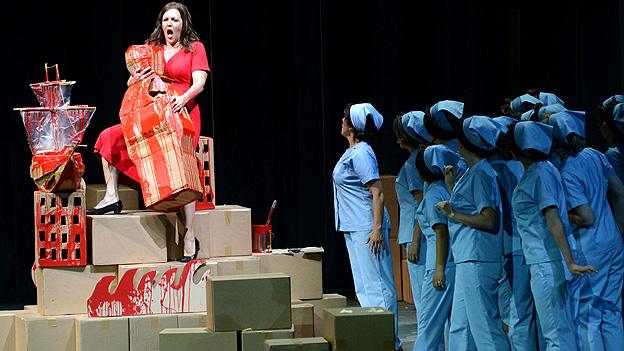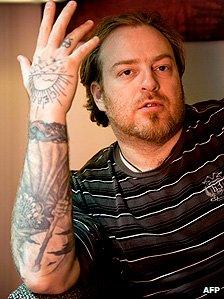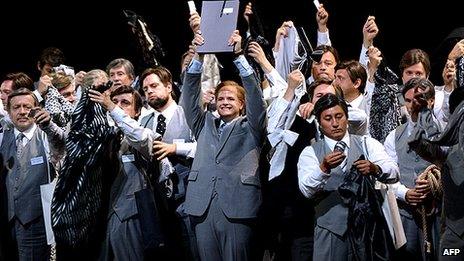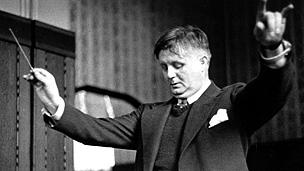Bayreuth festival's tradition of Wagnerian controversy
- Published

Germany's annual Bayreuth festival celebrating the music of Richard Wagner has been haunted by controversy over the years because of Wagner's own anti-Semitism - and the 2012 festival is continuing the tradition.
No Bayreuth festival is complete without a Nazi row, and this year's has been a really good one.
Everybody who is anybody was dressed up and ready to go. Angela Merkel's best frock (cobalt blue in my view) was pressed and shimmering.
The red carpet was scrubbed clean. The lobster sausages were ordered - this being Bavaria, there have to be sausages but they must be posh ones.

Evgeny Nikitin has denied having links to any fascist movement
And everybody was very excited about the Russian baritone, Evgeny Nikitin, in the title role of the new production of the Flying Dutchman.
And then the papers had to go and spoil it.
They got hold of a picture of the star singer in a previous incarnation - as a heavy-metal drummer in a Russian rock band, with a very large swastika tattooed on his chest.
A Wagnerian thunder was unleashed. Nikitin promptly withdrew.
The singer regretted the tattoo and had had it covered with a non-offensive, even bigger one but he paid for the mistake of youth by losing the most prized role in opera - the star of a new Wagner production in the opera house that is a shrine to Wagner.
In the event, the South Korean stand-in was excellent.
But there were boos for the production which in, I think, a very German way, was - how can I put this? - overly intellectual.
In the opera as Wagner wrote it, the Flying Dutchman is doomed to sail the oceans for eternity.
He can be released from the curse only if a woman vows to love him for ever, but in this production there are no waves or storms.
The Dutchman is a businessman, complete with wheelie-suitcase, cursed to roam the soulless city, represented by the neon tickers of flashing numbers (maybe stock prices).

The Flying Dutchman was set in the world of modern-day capitalism
It is about capitalism, you see - finance capitalism!
And Wagner's spinners of thread are now factory workers, filling cardboard boxes with electric fans.
It must have meant something but, I have to say, I am not sure what.
Anyway, the audience cheered the musicians and booed the idea.
It seemed to me that the best mental stimulation was actually outside the house, in the grove of chestnut trees sheltering a statue of the stern face of Wagner himself.
In this glade, is a new exhibition called Silenced Voices.
On either side of the manicured lawn are upright metal slabs, and on them are engraved the biographies of musicians, nearly all Jewish, either killed in the Holocaust or forced to flee.
The inscriptions say it all.
Hendrik Prins. Violin. Born September 12, 1881. Died Auschwitz, June 29, 1943.
Lucian Horwitz, Cello, Died Auschwitz, date unknown.
And also musicians who survived but, by fleeing, were lost to Germany:
Fritz Busch died London, September 14, 1951.

Fritz Busch was dismissed because of his opposition to the Nazi government
One of Germany's greatest conductors, he was stripped of his post in 1933 - publicly, on stage at the Semper Opera in Dresden where he had conducted premieres of operas by the Nazi acolyte, Richard Strauss.
The Wagner family still running the festival can never escape the past although, to be fair, they are addressing it. This exhibition is, after all, in the grounds that they control.
They will be much wrestling with the past next year on the 200th anniversary of Wagner's birth.
He was the author of nasty little anti-Semitic tracts and there is an ongoing and fiery debate about whether anti-Semitism permeates the operas.
And if it does (and, to my mind, you cannot avoid it in some) can they still be enjoyed by right-thinking people, Jewish or not?
Bayreuth will be busy then, during his anniversary. A controversial director has been hired - cue more "row" headlines.
The music will still be sublime, of that I am sure. It will be Wagner in Wagner's acoustic. With the orchestra hidden and balanced with the singers, in a way that it is not in any other opera house, where the bands sits in the open pit in front of the stage.
There is much talk of authenticity in music, getting close to sound of the time.
Bayreuth surely has close to the authentic sound and also the authentic feel. The wooden seats will be as hard as they were in Wagner's day, as hard as his glower in the statue outside.
You know, you can have too much authenticity.
How to listen to From Our Own Correspondent:
BBC Radio 4: A 30-minute programme on Saturdays, 11:30 BST.
Second 30-minute programme on Thursdays, 11:00 BST (some weeks only).
Listen online or download the podcast
BBC World Service:
Hear daily 10-minute editions Monday to Friday, repeated through the day, also available to listen online.
- Published22 July 2012